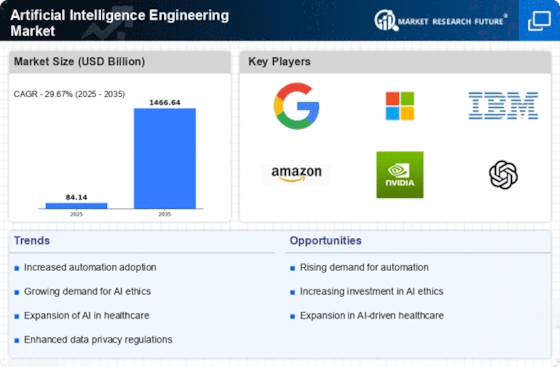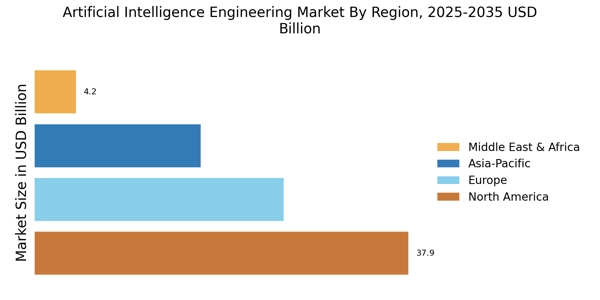Rising Demand for Automation
The Artificial Intelligence Engineering Market experiences a notable surge in demand for automation across various sectors. Organizations are increasingly adopting AI technologies to streamline operations, enhance productivity, and reduce operational costs. According to recent data, the automation market is projected to reach USD 200 billion by 2025, indicating a robust growth trajectory. This trend is driven by the need for efficiency and the ability to process vast amounts of data quickly. As businesses seek to remain competitive, the integration of AI solutions becomes essential, thereby propelling the growth of the Artificial Intelligence Engineering Market. Companies are investing in AI-driven tools that facilitate decision-making processes, optimize supply chains, and improve customer experiences. Consequently, this rising demand for automation is likely to continue shaping the landscape of the Artificial Intelligence Engineering Market.
Integration of AI in Healthcare
The integration of artificial intelligence in healthcare is a pivotal driver for the Artificial Intelligence Engineering Market. AI technologies are being utilized to enhance diagnostic accuracy, personalize treatment plans, and streamline administrative processes. The healthcare AI market is projected to reach USD 36 billion by 2025, underscoring the sector's commitment to leveraging AI for improved patient outcomes. Machine learning algorithms analyze vast datasets, enabling healthcare professionals to make informed decisions swiftly. Furthermore, AI-driven tools assist in drug discovery and patient monitoring, showcasing the transformative potential of AI in this field. As healthcare providers increasingly adopt these technologies, the demand for AI engineering solutions is expected to rise, thereby propelling the growth of the Artificial Intelligence Engineering Market. This integration not only improves operational efficiency but also enhances the overall quality of care.
Growing Investment in AI Startups
The Artificial Intelligence Engineering Market is witnessing a surge in investment directed towards AI startups. Venture capital funding for AI-related ventures has reached unprecedented levels, with investments exceeding USD 30 billion in the past year alone. This influx of capital is indicative of the confidence investors have in the potential of AI technologies to revolutionize various industries. Startups are developing innovative solutions that address specific challenges, ranging from automation to data analytics. As these companies emerge and scale, they contribute to the diversification and dynamism of the Artificial Intelligence Engineering Market. The competitive landscape is evolving, with established firms seeking partnerships and acquisitions to enhance their AI capabilities. This trend of growing investment not only fuels innovation but also accelerates the development of cutting-edge AI solutions that can be integrated across different sectors.
Regulatory Support for AI Development
Regulatory support for artificial intelligence development is becoming increasingly prominent, influencing the trajectory of the Artificial Intelligence Engineering Market. Governments are recognizing the importance of establishing frameworks that promote ethical AI practices while fostering innovation. Recent initiatives aim to create guidelines that ensure transparency, accountability, and fairness in AI applications. This regulatory environment encourages businesses to invest in AI technologies, knowing that they operate within a supportive legal framework. As countries implement policies that facilitate AI research and development, the market is likely to experience accelerated growth. The establishment of public-private partnerships further enhances collaboration between government entities and the private sector, driving advancements in AI engineering. This regulatory support not only mitigates risks associated with AI deployment but also instills confidence among stakeholders, thereby contributing to the overall expansion of the Artificial Intelligence Engineering Market.
Advancements in Machine Learning Algorithms
The Artificial Intelligence Engineering Market is significantly influenced by advancements in machine learning algorithms. These innovations enhance the capabilities of AI systems, enabling them to learn from data more effectively and make predictions with greater accuracy. Recent developments in deep learning and neural networks have led to breakthroughs in various applications, including natural language processing and computer vision. The market for machine learning is expected to grow at a compound annual growth rate of 40% over the next five years, reflecting the increasing reliance on these technologies. As organizations recognize the potential of machine learning to drive insights and innovation, investments in AI engineering are likely to escalate. This trend not only fosters the growth of the Artificial Intelligence Engineering Market but also encourages collaboration between tech companies and research institutions to further refine these algorithms.

















